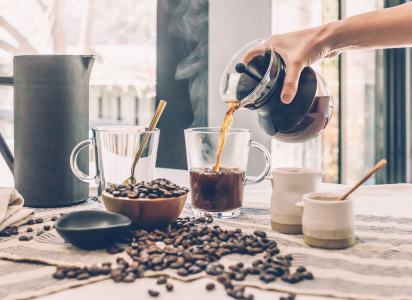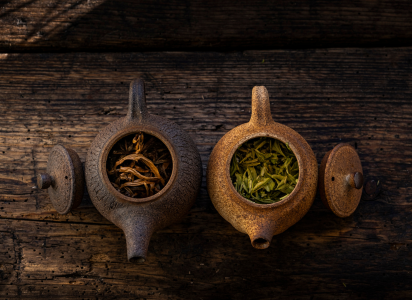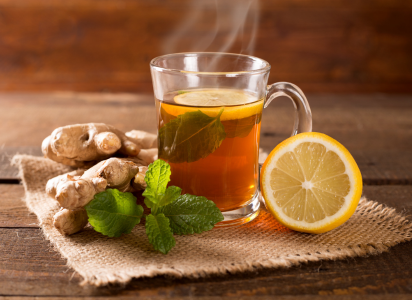For most people, coffee is top of mind when you talk about caffeine, but tea should be high on that list as well. Of all the beverages that contain caffeine, these are the two most popular. Let’s take a look at coffee and tea and how they measure up against one another for caffeine content, health benefits, and taste.
This can help you make the decision about which is best, and which is right for you and your needs. It’s easy to agree that caffeine is an incredibly popular stimulant. It can be found in over sixty different plant species all over the globe and is most commonly found in coffee, tea, and chocolate. While there are many different drinks today that contain caffeine, the most popular are still coffee and tea. In fact, some studies show that 80% of people in the United States drink one or the other.
According to Coffee Rank, about 65% of Americans drink coffee every day. And nearly 80% of all American households have tea, per the Tea Association of the USA. That’s a lot of people drinking tea and coffee, so let’s explore these popular beverages in more detail.
In this article, we’re going to look at how they compare caffeine content, health benefits, taste, and environmental impact. Which one do you predict will come out on top?
Which One Has More Caffeine?
If you look at them in their raw form – coffee beans vs tea leaves – then coffee does have more caffeine. However, that fact won’t do you much good unless you’re going around munching on coffee beans and chewing on tea leaves. Instead, we need to see how their caffeine contents stack up once they are prepared as beverages.
One key factor in how much caffeine a drink will have is the brewing temperature. Coffee is usually brewed at a higher temperature than tea, so it typically has a higher caffeine level. A cup of coffee is also typically more concentrated than a cup of tea. Typically, people use five grams less tea leaves per cup than coffee.
How much caffeine is in an average cup of coffee or tea? Let’s take a look.
Caffeine content of coffee

To find out the caffeine content of your coffee, you need to consider the type of coffee, the brewing time, and the preparation method. The average 8oz. cup of brewed coffee has about 85mg of caffeine. An espresso can have 60 mg of caffeine per shot. A double shot is the standard at most coffee shops for espresso drinks and this will contain 120mg per drink. It’s easy to see how quickly that can add up.
When considering how much caffeine you’re getting from your coffee, it’s also important to think about the number of cups of coffee you enjoy a day as well. If you drink a big, tall mug, that’s going to be more than a standard 8oz “cup”.
Instant coffee usually has around 60mg of caffeine and decaf even has about 2mg of caffeine. It’s minuscule but even decaf is not 100% caffeine-free.
Caffeine content of tea

The amount of caffeine in tea varies based on the type of tea. Most teas are made from the Camellia sinensis plant and will contain caffeine. There are, however, a few exceptions. Black, white, and green tea all come from the leaves of the same plant, but there are some things that make them different.
The time of harvest and the oxidation are what separates one type from the others. Black tea has the highest amount of caffeine, at an average of 45-60mg per cup. This makes it comparable to a single shot of espresso.
Green tea has about 20-45mg of caffeine, making it a lower caffeine tea. And then white tea can have from 6mg of caffeine to 60mg. Green tea and white tea are both brewed for less time and with a lower water temperature and they have less caffeine, in general, than black tea.
Some other types of tea with higher caffeine counts include matcha team, which has 45mg per one gram serving and Yerba mate, which has up to 85 milligrams of caffeine per cup. This makes in comparable to your average cup of coffee.
Chamomile, ginger, and peppermint tea have no caffeine at all, and these teas are not made from Camellia sinensis. Caffeine-free teas like chamomile and ginger are made from dried flowers, leaves, seeds, or roots of the plants.
If you want to enjoy the taste of tea without the caffeine boost, stick with these herbal teas that have little to no caffeine at all.
Which One is Healthier?
The next thing that comes up most often about coffee vs tea is the health benefit. Both have caffeine, as we discussed above. This caffeine helps boost mental function and short-term memory and can have other neurological benefits.
But what you may not know is that coffee and tea are both rich in antioxidants. Antioxidants have an important function of helping your body against free radical damage. Antioxidants help boost your immune system so you can better fight infections and diseases.
Studies have proven that antioxidants help prevent certain types of chronic diseases such as lung and colon cancer, other cancers, and more that we will go into detail below.
Your caffeine intake is important to consider when it comes to your overall health. While moderate amounts of caffeine can be beneficial, too much can have negative consequences. Coffee and tea have both been shown to bring health benefits to the user. Let’s take a look at how they measure up and which one is healthiest.
How much coffee you drink also has an impact on how healthy it is. The positive effects of caffeine will wane when you overdo it. This is a perfect example of “less is more”. But let’s look at the benefits of drinking coffee.
Benefits of drinking coffee

The most obvious benefit of drinking coffee is that the caffeine gives you an energy boost. But what else does it have to offer?
Here are some benefits of drinking coffee:
- It has B vitamins
- It as potassium
- It has riboflavin
- It is a great source of antioxidants
- Lowers risk of cardiovascular disease
- Lowers chance of Type 2 diabetes
- Lowers risk of neurological diseases
- Helps protect against liver disease
- Can lower risk of certain cancers
- Can help lower risk of depression
As you can see, caffeine isn’t the only thing coffee has going for it. How can you determine the health content of your coffee?
Health content of coffee
To determine the health content of coffee, it’s important to look at the amount of coffee and the ingredients. Coffee was once considered unhealthy, but we now know differently and that there are actually many benefits to it.
Coffee can help reduce the risk of two 2 diabetes, Alzheimer’s disease, Parkinson’s disease, and more. Some people also find it helps aid in weight loss (when combined with healthy diet and exercise).
Coffee is said to help reduce the risk for heart disease when used in moderation. Abusing caffeine can lead to a heart attack. So, as you can see, it’s a delicate balance and it’s all about using it in moderation. Some other risks of too much caffeine include dehydration, anxiety, headaches, dizziness, rapid heart rate, irregular heart rhythm, insomnia, and more.
Benefits of drinking tea

Maybe you started drinking tea because you though it was better for you than coffee. Let’s take a look into whether or not this is true. Is tea better for your health than coffee?
Tea drinkers might use a cup of tea to get their energy boost in the morning or in the early afternoon, but does it have any health benefits beyond that?
Here are some benefits of drinking tea:
- It has antioxidants
- Lower cholesterol
- Helps promote clearer skin
- Helps you focus
- Soothes digestion
- Has important vitamins and minerals
- Some versions are calorie-free
If you’re drinking tea for the health benefits, just remember to enjoy in moderation to avoid the health risks of too much caffeine. Too much can lead to high blood pressure, jitters, increased anxiety, trouble sleeping, and more.
Health content of tea
When you need to know the health content of tea, you first need to consider the type of tea. This is because different types of tea can have varying ingredients and different benefits. From there, you also want to look at any additives you drink with your tea.
Do you add honey or milk or another creamer? You need to take these into consideration, as well as how many cups a day you drink.
Which One Tastes Better?
Now you might be wondering which one tastes better and the simple answer is – it depends!
Everyone has different tastes and what is better to one person may not be to another. We can’t really tell you which one tastes better because you have to try for yourself and see. While it’s true that many people prefer one or the other, there are also a lot of people who enjoy both.
Some studies have shown that genetics could play a role in whether or not you like coffee or tea. This is because both of them contain bitter flavors and your genes can impact how you experience these bitter flavors and which ones appeal to you more.
In general, coffee has a more bitter taste than tea. Although this can vary from types of coffee and tea and also how you prepare them. Tea tends to be less acidic than coffee, based on the pH scale, but again, it’s just a general guideline.
Also keep in mind that our taste buds change over time so even if you don’t like one or the other today, you might like it at some point in the future. Another thing that coffee and tea drinkers both have recognized is that a taste tolerance can build over time. Many people start drinking coffee or tea for the caffeine but don’t particularly love the flavors at first. But over time, it can grow on you.
Which One is Better for the Planet?

If you want to be eco-conscious with your caffeine beverage choices, then you might be asking which one of these is better for the environment. Many people who enjoy coffee or tea are not thinking of the impact that cup is having on the environment. However, if you’re one who focuses on sustainability and making a healthier planet earth for us all to live on, then you may want to know which is better for the planet.
When we look at how eco-friendly a coffee or tea is, we need to explore all aspects of the manufacturing process. This includes:
- How it is grown
- How it is harvested
- How it is processed
- How it is packaged
- How it is shipped
Overall, tea has a lower carbon footprint than coffee. However, this is just a general comparison. As we stated above, there are different factors that can play into this answer.
According to BBC News’ “Climate change food calculator,” a cup of tea every day adds around 33 pounds to your annual greenhouse gas emissions. A cup of coffee comes in around 10 times that. But again, it’s not as cut and dried as that. You’ll need to consider how it’s grown and harvested. You can choose brands that are more eco-friendly, if you do some research into this.
Tea that is produced using charcoal and firewood lead to deforestation and are not as sustainable as those made from more eco-friendly means. Coffee plants grown under shade treats are more eco-friendly that those grown in full sun. While the sun-grown coffee grows faster, it also leads to deforestation.
There are more sustainable options for both coffee and tea if you look for them. In addition to researching how they are grown and harvested, you can also look at how much plastic is used in the packaging. And some tea bags are made of plastic.
You also must think about how you consume your drink. In fact, one of the biggest factors in the carbon footprint of your tea or coffee is the milk you add to it. If you want to make your coffee or tea more eco-friendly, consider non-dairy creamers and more eco-friendly options.
Conclusions
When it comes to coffee and tea, there is no clear winner. As you can see above whether or not one is healthier depends on how you make it and also your overall goals and lifestyle. Will you enjoy a cup of Joe or your favorite cup of tea today? Or maybe you’ll end up having both?
The most important thing to remember about both coffee and tea is that broad generalizations like “black tea has more caffeine than green” or “coffee causes insomnia” are not completely true. It’s more important to look at all the facts, as we’ve outlined above.
Whether you start your day with coffee or tea, or you’re looking for a little mid-day pick-me-up, it’s important to know how much caffeine is in your tea or coffee. This is important to your health and also to make sure that you don’t get side effects of caffeine overdose.
While caffeine in general is considered safe to use, just like anything, there is such a thing as too much of a good thing. Experts recommend not to have more than 400mg of caffeine in a day, although every person’s tolerance can vary.
When you’re smart about it, you can enjoy the benefits of coffee or tea (or both) without the potential downsides. Which one would you vote for in the ultimate caffeine showdown?